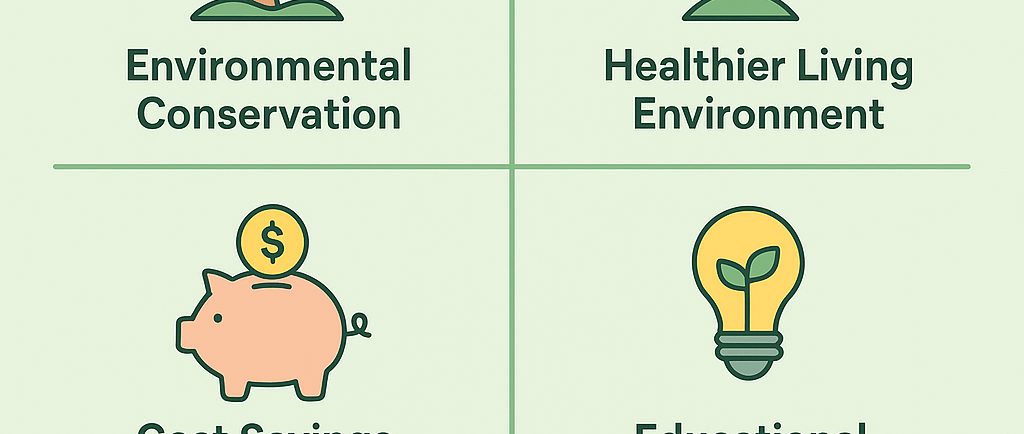Benefits of a sustainable Campus
Blog post description.


Benefits of a Sustainable College Campus
A college campus is more than just a place for academic learning—it is a community where students, teachers, and staff interact daily. As the world faces environmental challenges such as climate change, pollution, and resource depletion, the idea of a sustainable campus has gained great importance. A sustainable campus integrates eco-friendly practices into its design, operations, and lifestyle, ensuring that education goes hand in hand with environmental responsibility. The benefits of such an approach are both immediate and long-lasting.
1. Environmental Conservation
The most direct benefit of a sustainable college campus is the positive impact on the environment. By adopting practices like tree plantation, waste segregation, composting, solar energy, and rainwater harvesting, campuses reduce their carbon footprint. These measures not only save natural resources but also set an example of environmental stewardship. For instance, using solar panels lowers dependence on fossil fuels, while proper waste management reduces land and water pollution.
2. Healthier Living Environment
A sustainable campus ensures a healthier atmosphere for students and staff. More green spaces mean cleaner air, reduced noise pollution, and a refreshing environment that promotes mental well-being. The presence of trees and gardens provides shade, reduces heat, and encourages outdoor activities, which contribute to physical fitness and stress reduction. Clean water systems and chemical-free environments further safeguard the health of the campus community.
3. Cost Savings and Efficiency
Sustainability is not just about protecting nature—it is also about wise resource management. Energy-efficient buildings, water recycling systems, and renewable energy sources help colleges cut down on utility costs. Reduced paper usage through digital learning and proper recycling also saves money in the long run. These savings can be redirected towards scholarships, infrastructure, or research, making the institution financially stronger.
4. Educational Value
A sustainable campus becomes a living laboratory for students. Instead of just reading about environmental science, students can see and participate in real-life sustainability practices. This hands-on experience enhances their understanding and motivates them to adopt eco-friendly habits in their personal lives. Colleges that encourage student involvement in sustainability projects also promote leadership, innovation, and responsibility.
5. Social Responsibility and Reputation
Sustainable practices improve the image of the institution. In today’s world, students and parents prefer colleges that are forward-thinking and socially responsible. A green campus reflects the values of care, responsibility, and innovation, making it attractive to prospective students. Moreover, by demonstrating commitment to sustainability, colleges contribute to the larger goal of building a society that values environmental preservation.
6. Preparing Students for the Future
Finally, a sustainable campus prepares students for the future job market. Many industries today value sustainability and eco-consciousness. Students who learn and practice these values on campus are better equipped to work in organizations that prioritize green policies, giving them an edge in their careers.
Conclusion
In conclusion, a sustainable college campus benefits not just the environment but also the health, economy, education, and reputation of the institution. By embracing eco-friendly practices, colleges create a model of responsible living that inspires students and communities alike. Building such campuses is not just an option—it is a necessity for a cleaner, healthier, and brighter future
